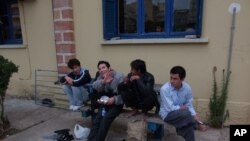With hundreds of thousands of illegal migrants entering Europe every year, European Union countries are joining forces to bolster the Union's borders. Police officers from across the continent have arrived in Greece for "Operation Poseidon", aimed at securing the EU's border with Turkey, the gateway.
It's the middle of the night overlooking the border between Greece and Turkey. A team of Austrian and Greek police uses thermal cameras to detect migrants trying to cross illegally into Europe.
"Now we are looking from here to the Greek-Turkey borderline; it is about seven to eight kilometers," an Austrian guard explained.
This border used to separate two countries at war. But with Greece part of the European Union, the Greek-Turkish border now separates the EU from the outside world. An estimated 10,000 people, most from North Africa and South Asia, cross it illegally every month.
European governments have come together to stem the flow. Under a coordinating body called Frontex, they are sending officers to aid Greece in securing the frontier.
Many migrants swim across the Evros River between Turkey and Greece. Others try a more audacious route.
At official crossing points like here at Kipi, officers use the latest technology to detect immigrants hiding in vans and trucks.
"The four sensors can detect the heart beat of a person if there's one on board," a German gaurd said.
Next to the border point is a fleet of impounded vehicles. Each has a unique story, like this double-decker coach. Border guards became suspicious of the passengers - and took a closer look.
"There was supposed to be a water tank here, but there was a double surface, a Greek gaurd said. "And we discovered along with the police that something wasn't right. Then, actually, we drilled on the other side, and we opened here and we found a compartment where there were 6 people hiding."
Once the migrants are caught, Frontex officers interview them to learn about the networks used by traffickers.
"I've been interviewing people for 10 years now, and they say, 'We were hidden in the truck or a boat and we have walked through Turkey,'" says Danish officer Michael Ekmann, "and we've said 'Yeah yeah yeah come on please tell us the real story.' And then suddenly you experience it and you say 'Oh dear, it's true.' They really are being transported like cattle sometimes and it's true there are some people earning a lot of money."
Here in the Greek port of Pireaus, outside Athens, Frontex has opened an office to cope with the huge numbers of migrants arriving in this region, and to stop those who try to slip into Greece through the port.
The head of the organization, Ilkka Laitinen, says migrants from countries like Morocco, Algeria and even Afghanistan try all kinds of ways to enter Greece.
"It's now more and more possible to fly from northern African countries to Turkey, and Istanbul is the hub where many low-cost carriers are operating, and these flights are fully booked," Laitinen said.
Frontex claims it's having success. But the increased show of force is unlikely to discourage many of the migrants who risk their lives trying to reach Europe's shores.




